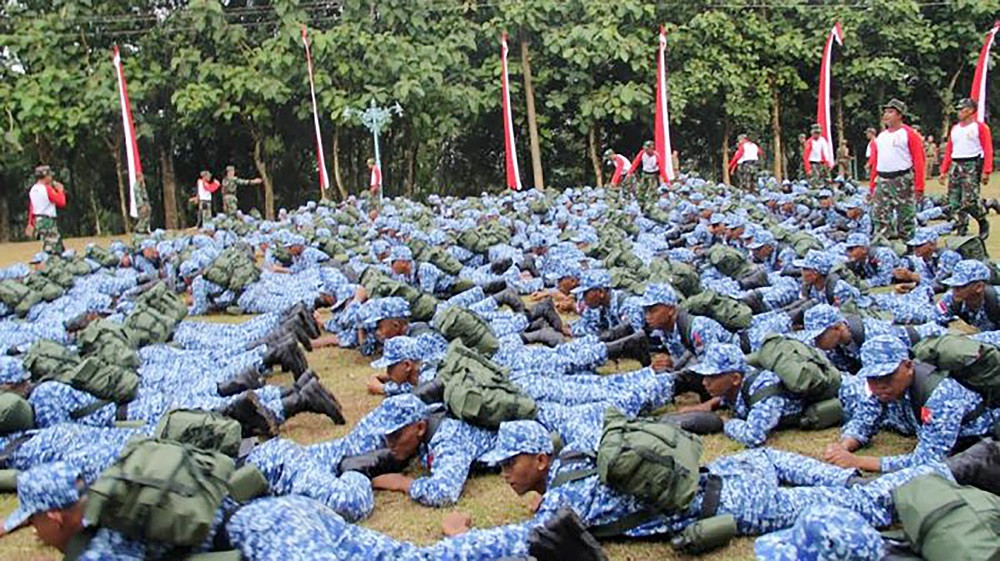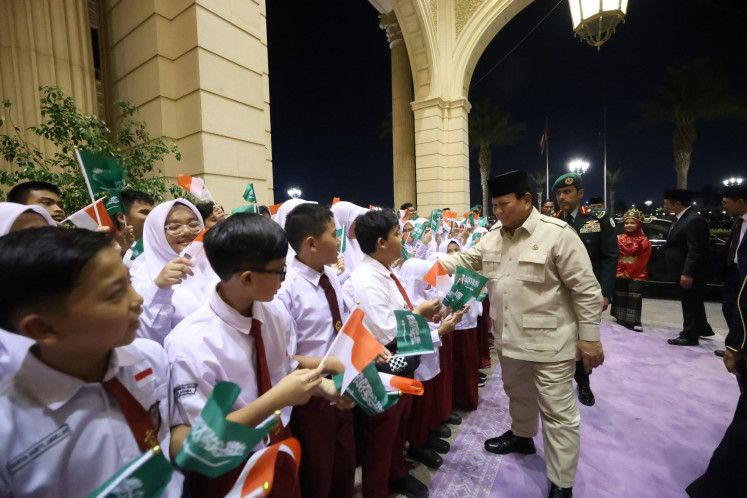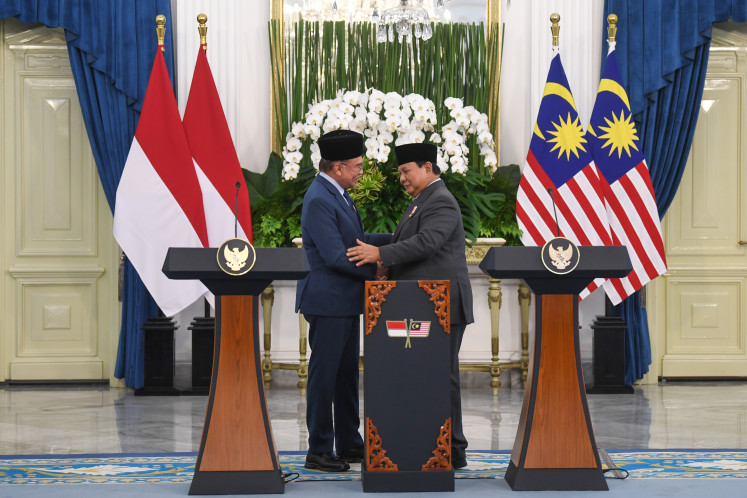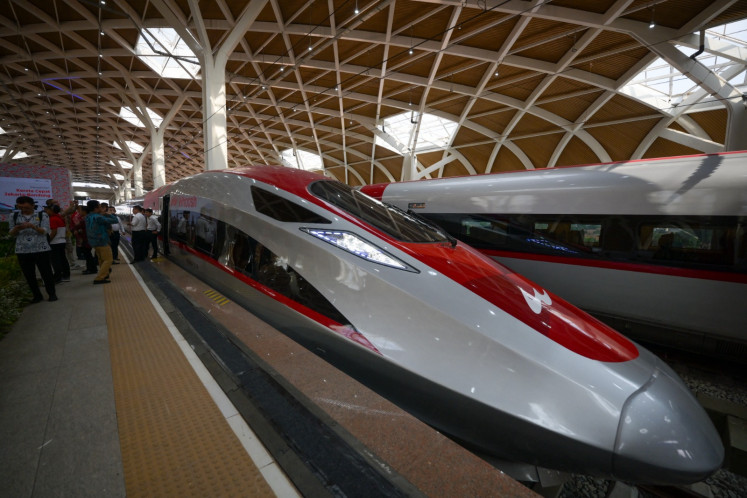Popular Reads
Top Results
Can't find what you're looking for?
View all search resultsPopular Reads
Top Results
Can't find what you're looking for?
View all search resultsForming Komcad not a pressing need
Furthermore, it is feared that the formation of Komcad can be used to justify the reinstatement of militia groups.
Change text size
Gift Premium Articles
to Anyone

O
n Jan. 12, 2021, President Joko “Jokowi” Widodo signed Government Regulation (PP) No. 3/2021 on the Implementation of Law No. 23/2019 on National Resource Management for State Defense (PSDN Law). Under the newly signed regulation, the Defense Ministry will begin recruiting and training for the National Reserve Component (Komcad).
The regulation allows the ministry to start recruiting the first 25,000 members of the reserve corps.
Even before its inception in 2019, the PSDN Law had stirred debate over its legislation and substance. Procedure-wise, the law is deemed as flawed, as it was deliberated hastily in a manner that excluded transparency and public consultation. This process of legislation is seen to violate Law No. 12/2011 on the Formulation of Laws and Regulations, which mandates public consultation in formulating any law or regulation.
Meanwhile, in terms of substance, the PSDN Law contains problematic articles that are open to multiple interpretations that contradict human rights principles and standards.
One of the main problems of the PSDN Law is its considerably broad scope of threat. Article 4, Paragraph 2 of the law defines the scope of threat as inclusive of military threats, non-military threats and hybrid threats. A hybrid threat is a combination of both military and non-military threats.
According to Article 4, Paragraph 3 of the law, the three aforementioned types of threats are further broken down into aggression, terrorism, communism, separatism, armed rebellion, natural disasters, environmental damage, border violations, trafficking and theft of natural resources, outbreaks of disease, drug trafficking and abuse, cyberattacks, nuclear attacks, biological attacks, chemical attacks and other types of threats that endanger the sovereignty, territorial integrity or the security of the Republic of Indonesia.
The law’s broad scope of threat may create a distinct problem, as Komcad can be deployed to deal with any threats to domestic security that the government claims to have risen from communism, terrorism or domestic conflicts, a move that could instead trigger communal or horizontal conflicts in society.
Furthermore, it is feared that the formation of Komcad can be used to justify the reinstatement of militia groups under the guise of Pamswakarsa (civilian security unit) to deal with opposition and critics of the government. Under the law, the formation and deployment of Komcad should be oriented and aimed to support the Indonesian Military (TNI) as the main component of national defense in facing external military attacks.
Komcad is an integral part of the national defense force. However, its formation should follow the priority scale in the development of a modern and professional defense force, whose objective is to face the threat of war. In this context, the government should focus on strengthening its main component, the TNI, instead of forming a reserve component.
Moreover, with the limited defense budget of below 1 percent of gross domestic product (GDP), the government must be more efficient and effective in allocating the defense budget toward modernizing the defense system and the welfare of professional soldiers.
Presently, Indonesia’s budget for the procurement of defense equipment is deemed low, while the welfare of professional soldiers remains below expectations. The formation of Komcad will therefore be an extra burden on the defense budget.
Also flawed is the implementation of the TNI Law with regard to the Reserve Component during active duty as stipulated in Article 46 of the PSDN Law. At a time when military justice reform is a pressing need and military disobedience of the civilian judicial system persists, the PSDN Law ironically mandates Komcad to submit to the TNI Law.
The obligation of military personnel to submit to the general court system is mandated by Article 3, Paragraph 4 of People’s Consultative Assembly Decree (MPR) No. VII/2000 and Article 65, Paragraph 2 of Law No. 34/2004 on the TNI. Not only has the refusal of military personnel to comply with the general court system been rampant, it has also perpetuated impunity and hindered military justice reform.
The PSDN Law does not fully adopt human rights principles and norms. The principle of volunteerism under this law applies only during the recruitment process, but it becomes compulsory during mobilization. While it must be viewed broadly, volunteerism should apply not only during the recruitment process, but also during mobilization.
This principle also means that those citizens who have volunteered may later change their minds based on their faith or beliefs, known as conscientious objection. Moreover, the rules are also loose for determining nonhuman reserve components, namely natural resources and artificial resources, which could potentially lead the state to act in an arbitrary manner in seizing natural and artificial resources, thus violating the right to property of all citizens.
On top of that, Article 77, Paragraph 1 of the law threatens to criminalize Komcad members who reject the call for mobilization, even on the grounds of conscientious objection. The fact that the law contains no articles that regulate exceptions for those who decline active service in accordance with their beliefs is a violation of human rights principles and norms, specifically the right to conscientious objection.
In addition, the off-budget financing mechanism for Komcad is problematic, as this contradicts the principle of a centralized defense budget. Article 25, Paragraph 1 of Law No. 3/2002 on National Defense obligates the state budget to cover national defense spending.
Since the Cold War, the majority of conflicts between states have been settled through diplomacy and the international justice system; as such, the role of the police, intelligence agencies and the military is far more important than a reserve component.
All in all, there is no absolute urgency for the government to form Komcad today. It is advisable for the government to focus instead on economic recovery, development and strengthening the TNI.
Alternatively, if the government cannot wait, it can form Komcad by recruiting only civil servants (ASNs). Government control over ASNs who have passed their training will be more accountable and measurable.
As the formation of Komcad will do more harm than good, the President should therefore reconsider the program and order the Defense Ministry to put its plans on hold.
***
Al Araf is head of the Centra Initiative and Gustika Jusuf-Hatta is a researcher at Imparsial (The Indonesian Human Rights Monitor).









